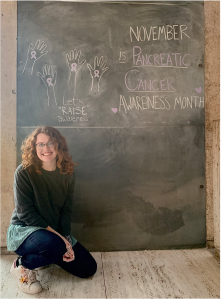 Name: Sasha (Alexandra) Fowler
Name: Sasha (Alexandra) Fowler
Hometown: Redding, CA
Hobbies: walking/running with my dog, taking care of my succulents, reading, and swimming
Lab: Engle Lab
Lab website: https://engle.salk.edu/
What do you study?
As a research assistant, I help with a wide variety of projects that have to do with pancreatitis or pancreatic cancer. We study how the immune system interacts with cancer cells, how cancer cells interact with the entire body, and ways to detect cancer before it has had time to move to other organs. We also study how disease progression differs between patients, and how drugs play into this complex disease.
As a research assistant, I help with a wide variety of projects that have to do with pancreatitis or pancreatic cancer. We study how the immune system interacts with cancer cells, how cancer cells interact with the entire body, and ways to detect cancer before it has had time to move to other organs. We also study how disease progression differs between patients, and how drugs play into this complex disease.
Why is it important?
We all know cancer can be deadly, but pancreatic cancer is especially so, as it is hard to detect, and hard to treat. Oftentimes patients already have a poor prognosis and life expectancy at the time of diagnosis. The best way to help these people is to either find a drug that treats advanced disease (not yet found in pancreatic cancer) or find a way to detect the cancer before it becomes advanced. Doing this will increase survival and outcome of pancreatic cancer patients.
We all know cancer can be deadly, but pancreatic cancer is especially so, as it is hard to detect, and hard to treat. Oftentimes patients already have a poor prognosis and life expectancy at the time of diagnosis. The best way to help these people is to either find a drug that treats advanced disease (not yet found in pancreatic cancer) or find a way to detect the cancer before it becomes advanced. Doing this will increase survival and outcome of pancreatic cancer patients.
What piqued your interest in science?
When I was young I read a lot about nature, and spent a lot of time exploring the woods around my house. Learning about the systems of the earth and the beings that inhabited it led to my passion for science and health.
When I was young I read a lot about nature, and spent a lot of time exploring the woods around my house. Learning about the systems of the earth and the beings that inhabited it led to my passion for science and health.
What do you like about being a scientist?
I love that there are always opportunities to learn – we are always learning more about how things work, and putting the pieces together is exciting and helpful. Knowledge is power, and we can use that power to help others.
I love that there are always opportunities to learn – we are always learning more about how things work, and putting the pieces together is exciting and helpful. Knowledge is power, and we can use that power to help others.
What are 5 general vocabulary terms someone should know going into your field of science?
Pancreas – an organ that regulates blood sugar and holds/utilizes digestive enzymes
Metastasis – cancer spreading from one organ to another, suggesting cancer cells have moved into the blood and invaded a healthy organ
Resection – surgically removing the cancerous tissue from the pancreas. This is currently the only way to cure pancreas cancer, and it is only removable sometimes.
Biomarker – a natural particle that is produced in the event of disease, whose concentration can be measured in the blood to assess progression
Malignant – growths that have invaded nearby healthy tissue and therefore pose a threat to other healthy tissues. Cancerous.
Pancreas – an organ that regulates blood sugar and holds/utilizes digestive enzymes
Metastasis – cancer spreading from one organ to another, suggesting cancer cells have moved into the blood and invaded a healthy organ
Resection – surgically removing the cancerous tissue from the pancreas. This is currently the only way to cure pancreas cancer, and it is only removable sometimes.
Biomarker – a natural particle that is produced in the event of disease, whose concentration can be measured in the blood to assess progression
Malignant – growths that have invaded nearby healthy tissue and therefore pose a threat to other healthy tissues. Cancerous.
What are 5 specific vocabulary terms someone should know about your research?
CA-19-9 – the biomarker used to track the progression of pancreatic cancer. A sugar that decorates other protein and changes expression patterns
KRAS – most common mutation in pancreatic cancer, considered one of the key drivers of the cancer being present in 95% of patients. When this gene is mutated, pathways become dysregulated
Pancreatitis – inflammation of the pancreas, very painful – a risk factor for pancreas cancer.
FOLFIRINOX – currently the best regimen we have for pancreas cancer that combines four different drugs that each act on the tumor differently
Gemcitabine – historical chemotherapy for pancreas cancer
CA-19-9 – the biomarker used to track the progression of pancreatic cancer. A sugar that decorates other protein and changes expression patterns
KRAS – most common mutation in pancreatic cancer, considered one of the key drivers of the cancer being present in 95% of patients. When this gene is mutated, pathways become dysregulated
Pancreatitis – inflammation of the pancreas, very painful – a risk factor for pancreas cancer.
FOLFIRINOX – currently the best regimen we have for pancreas cancer that combines four different drugs that each act on the tumor differently
Gemcitabine – historical chemotherapy for pancreas cancer
